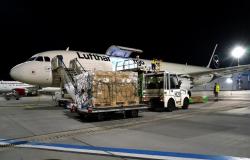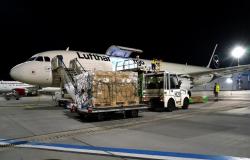In Antarctica, where the air temperature can drop to -60°C, 17 species of penguins fight for survival in extreme conditions every day, but now the rulers of the ice kingdom have been hit by a new challenge – a deadly strain of bird flu, the “National Geographic” channel reports.
Penguins are found only in the southern hemisphere of the planet, mainly in Antarctica, with the exception of the Galapagos penguins, which live near the equator, on the Galapagos Islands and in Ecuador, South America. The most popular penguin species are the king and emperor penguins, which get their name from their majestic appearance and demeanor.
Every Saturday and Sunday at 12.00, the guide with the green-red Liepaja flag in his hands will be waiting at the “Lielais dzintars” concert hall.
TIB of the Liepāja region
Emperor penguins are the largest penguin species in terms of height, reaching a length of up to 122 cm and a weight of up to 45 kg. King penguins, on the other hand, stand out with their luxurious, colorful fur. They have bright orange spots on the sides of their heads and upper chest, making them one of the most photogenic birds on Earth.
The ability to adapt is the main reason that has allowed penguins to survive in the icy winds. They have a very thick coat of feathers and a layer of subcutaneous fat to keep their body warm. Some penguin species, such as emperor penguins, form dense groups to stay warm together and shelter from the cold wind.
Resilience is definitely a trait that sets penguins apart from other animals, and they seem to have adapted to life in harsh conditions. But unfortunately, in reality, penguins are endangered. To draw attention to the protection of these noble birds, World Penguin Day is celebrated every year on April 25. This day is chosen because it is at the end of April that most penguin species begin their migration north from Antarctica.
In celebration of World Penguin Day, the National Geographic channel invites you to pay more attention to penguins and their importance, as well as discover new, unique facts about them!
Good appetite – whale margarine and penguin omelette for breakfast
In the 19th and 20th centuries, the penguin population experienced a significant decline. One of the rapidly flourishing directions of industrial industry at that time was the production of whale oil. Countless factories were built in Antarctica and the islands around it, producing oil lamps, soap and even margarine from whale blubber.
Notably, as technology developed, whale oil became an important raw material in the production of nitroglycerin, which was used as an explosive in both world wars. Whale liver oil, on the other hand, was the main source of vitamin D in the 1960s.
As a result, whales were not only over-hunted, but the environment was also destroyed. In the meadows inhabited by penguin colonies, there were dusty factories. Furthermore, factory workers treated these defenseless creatures with brutal cruelty, using penguin bodies as fuel in fat-melting furnaces and making omelets from penguin eggs.
The industry developed so rapidly that after 100 years the whales were on the verge of extinction and the penguins had completely left the coast. Fortunately, on August 27, 1859, Edwin Drake discovered the first oil well on a small farm in Titusville, Pennsylvania, USA. In the 20th century, scientists had already learned to extract fuel from crude oil, which put an end to whaling.
Henceforth, penguins had to contend mainly with the threats of modern climate change, such as melting glaciers, which also affect their food base. But the year 2024 came with surprising news – a deadly type of bird flu was confirmed for the first time on the mainland of Antarctica, which also threatens the huge penguin colonies of the southern region.
Penguin paradise on the world’s smelliest island
The largest colony of penguins in the world lives on Zavodovsky Island. It is one of the South Sandwich Islands in the Atlantic Ocean, home to an amazing number of approximately 1.5 million chinstrap or bearded penguins.
For penguins, it’s like a paradise on Earth – the island is surrounded by plenty of food, and its volcanic activity ensures warm soil and helps melt the snow faster. The heat also encourages the growth of sea grass and algae. These microorganisms are important in the marine ecosystem, providing food for fish and other marine animals that penguins eat.
As cozy as this island is to the penguins, it is as inhospitable to any other newcomer. Although the colony is an important study for scientists trying to understand how climate change and other external factors are affecting the penguins and their ecosystem, researchers have called it one of the most difficult places on Earth to access, comparing getting there not to paradise but to hell.
Interestingly, the early discoverers had drawn attention to the intense aroma of the island, which was called the smelliest in the world. It is said to have been felt even several kilometers from the coast. Penguin droppings and noxious fumes from fumaroles, vents through which jets of hot steam and volcanic gases escape, may have been to blame.
Several visitors to the island were forced to leave quickly because of the smell and were even poisoned. Also, many place names of Zavodovský Island refer to unpleasant smells, for example, Acid point, Smoke point, Noxious point or Smakas point.
Left in kindergarten for seven months
Penguins are master hunters, specializing in hunting fish, squid, krill (small marine crustaceans) and other marine animals. In addition, their excellent swimming and diving skills, combined with the ability to hold their breath for long periods of time, allow them to catch food even in deep water.
However, it should be noted that penguin food is not close to their home. Almost all penguin species migrate seasonally to warmer waters to ensure sufficient food for themselves and their offspring. These are long swims that often last from three to seven months.
Both mothers and fathers participate in foraging, leaving their young in community rearing areas, or “nurseries,” where they are protected from predators and extreme weather. In most cases, young penguins are forced to spend up to half a year alone.
Another challenge for parents when they return from hunting is to find their offspring among tens of thousands of other penguins that are visually almost indistinguishable. For this, penguins use their excellent hearing and communication skills by making unique sounds. Also, parents use visual memory, or try to remember a specific place in the parenting area where they left their baby.
Unfortunately, not all hunts end successfully. Often the long swim turns out to be too tiring, especially for younger penguins. Other times on the way you have to meet an unfavorable enemy. Sometimes when parents return, they find that their baby has frozen to death or died from a predator attack. These cases are very severe and the penguins survive by showing clear emotional reactions, such as frantically searching for their baby or making screaming sounds.
The most responsible dads in the world
Penguins take their parental duties very seriously. Taking into account the dangerous living conditions – cold, lack of food, natural enemies – penguins have to take care of their offspring very carefully. For example, most penguins incubate their eggs on their feet to avoid contact with the cold ice, and their body feathers help maintain the necessary temperature for the chick’s survival. There are some species of penguins that make nests out of grass or rocks.
King penguins incubate eggs in shifts. After laying the egg, the mother keeps it with her, under her feathers, in warmth. She then gently hands the egg to her father. This process requires high precision and caution, as any careless movement can damage the egg or even cause its loss. The female uses her legs and beak to gently transfer the egg from her legs to the father’s legs.
The father continues to incubate the egg while the female goes to sea to replenish her energy reserves by hunting fish and other food. The female returns after several weeks, and then it’s time for the father to go hunting.
Male emperor penguins are famous for being responsible for their precious egg the longest. After laying their eggs, female emperor penguins go to sea for about two months, leaving their fathers alone to guard the egg. Admittedly, emperor penguin dads don’t mind taking on the responsibility of raising their babies as well. They actively look after young pranksters.
Penguins can “fly” in water
Undeservedly, penguins have gained the fame of the clumsiest birds. It’s true that penguins can’t fly. There are also a lot of videos on the Internet, in which the peaceful furries can be seen, slipping on the ice or crawling along a rocky shore while gazing. They just have very short legs, which makes walking difficult. In addition, the base of the flippers in penguins is also very smooth, which hinders them when moving on land, but is their trump card when they are underwater.
In the water, penguins are masters of their element, being as graceful as dolphins and as fast as sharks. The Gentoo penguin is the fastest swimmer of its kind and can reach speeds of up to 50km/h. The emperor penguin, on the other hand, can hold its breath for up to 22 minutes at a depth of 500 m.
When you watch penguins in action, their swimming seems very similar to flying. Jumps in the air before diving, reminiscent of dolphins, also look graceful. Penguins do this to release air bubbles from their feathers and improve hydrodynamics.
The penguin has also been chosen as the symbol of one of the US professional ice hockey clubs based in Pittsburgh, Pennsylvania – the Pittsburgh Penguins. By the way, three Latvians also played in it – Pēteris Skudra, Viktors Ignatjevs and Teodors Bļugers!
National Geographic Channel welcomes everyone on World Penguin Day and invites everyone to learn something from these hardy, responsible and determined birds!
Tags: Antarctic kings emperors clumsy land unstoppable water
-





